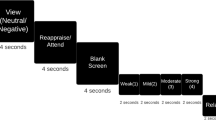The study presents functional magnetic resonance imaging (fMRI) data on the brain activity in depression and psycho-diagnostic indicators that characterize cognitive activity strategies of positive social emotion regulation. It was shown that fMRI activity of the brain during viewing of emotionally neutral and moderately positive images and searching for an optimal self-regulation strategy was associated with changes in activation in the dorsomedial prefrontal cortex. Analysis of behavioral factors showed that strategies of searching for the optimal way of emotional self-regulation were closely related to the general style of behavior, level of uncertainty tolerance, and commitment. The integration of psycho-diagnostic and neuroimaging data allows deeper understanding of the mechanisms of emotions regulation that contributes to the optimization of protocols for the diagnosis and treatment of depressive disorders.
Similar content being viewed by others
References
Arias-de la Torre J, Vilagut G, Ronaldson A, Serrano-Blanco A, Martín V, Peters M, Valderas JM, Dregan A, Alonso J. Prevalence and variability of current depressive disorder in 27 European countries: a population-based study. Lancet Public Health. 2021;6(10):e729-e738. https://doi.org/10.1016/S2468-2667(21)00047-5
Mel'nikov MYe, Bezmaternykh DD, Shubina OS, Shtark MB. Imaging of the brain activity in depression with FMRI: paradigms and results. Uspekhi Fiziol. Nauk. 2017;48(2):43-71. Russian.
Laptook RS, Klein DN, Dougherty LR. Ten-year stability of depressive personality disorder in depressed outpatients. Am. J. Psychiatry. 2006;163(5):865-871. https://doi.org/10.1176/ajp.2006.163.5.865
Mezulis AH, Abramson LY, Hyde JS, Hankin BL. Is there a universal positivity bias in attributions? A meta-analytic review of individual, developmental, and cultural differences in the self-serving attributional bias. Psychol. Bull. 2004;130(5):711-747. https://doi.org/10.1037/0033-2909.130.5.711
Zlobina MV, Pervushina ON. Intolerance for ambiguity and depression. Reflexio. 2017;10(2):126-141. Russian.
Seligman MEP. Authentic Happiness: Using the new positive psychology to realize your potential for lasting fulfillment. New York, 2002.
Schilbach L, Müller VI, Hoffstaedter F, Clos M, Goya-Maldonado R, Gruber O, Eickhoff SB. Meta-analytically informed network analysis of resting state FMRI reveals hyperconnectivity in an introspective socio-affective network in depression. PLoS One. 2014;9(4):e94973. https://doi.org/10.1371/journal.pone.0094973
Shtark MB, Korostishevskaya AM, Resakova MV, Savelov AA. Functional magnetic resonanse imaging and neuroscience. Uspekhi Fiziol. Nauk. 2012;43(1):3-29. Russian.
Koush Y, Meskaldji DE, Pichon S, Rey G, Rieger SW, Linden DE, Van De Ville D, Vuilleumier P, Scharnowski F. Learning Control Over Emotion Networks Through Connectivity-Based Neurofeedback. Cereb. Cortex. 2017; 27(2):1193-1202. https://doi.org/10.1093/cercor/bhv311
Garnefski N, Kraaij V, Spinhoven P. Negative life events, cognitive emotion regulation and emotional problems. Personality and Individual Differences. 2001;30(8):1311-1327.
Author information
Authors and Affiliations
Corresponding author
Additional information
Translated from Byulleten' Eksperimental'noi Biologii i Meditsiny, Vol. 175, No. 1, pp. 4-9, January, 2023
Rights and permissions
Springer Nature or its licensor (e.g. a society or other partner) holds exclusive rights to this article under a publishing agreement with the author(s) or other rightsholder(s); author self-archiving of the accepted manuscript version of this article is solely governed by the terms of such publishing agreement and applicable law.
About this article
Cite this article
Mazhirina, K.G., Bezmaternykh, D.D. & Shtark, M.B. fMRI Brain Response in Patients with Depression at the Time of Control of the Severity of Positive Social Emotions and Analysis of Behavioral Factors. Bull Exp Biol Med 175, 1–6 (2023). https://doi.org/10.1007/s10517-023-05798-y
Received:
Published:
Issue Date:
DOI: https://doi.org/10.1007/s10517-023-05798-y




